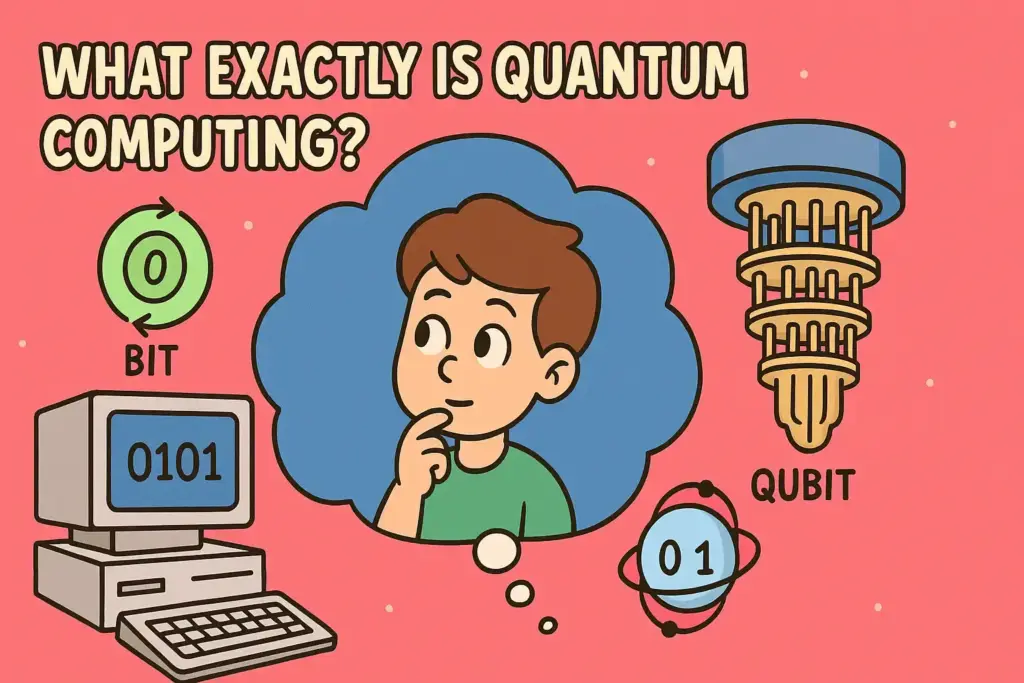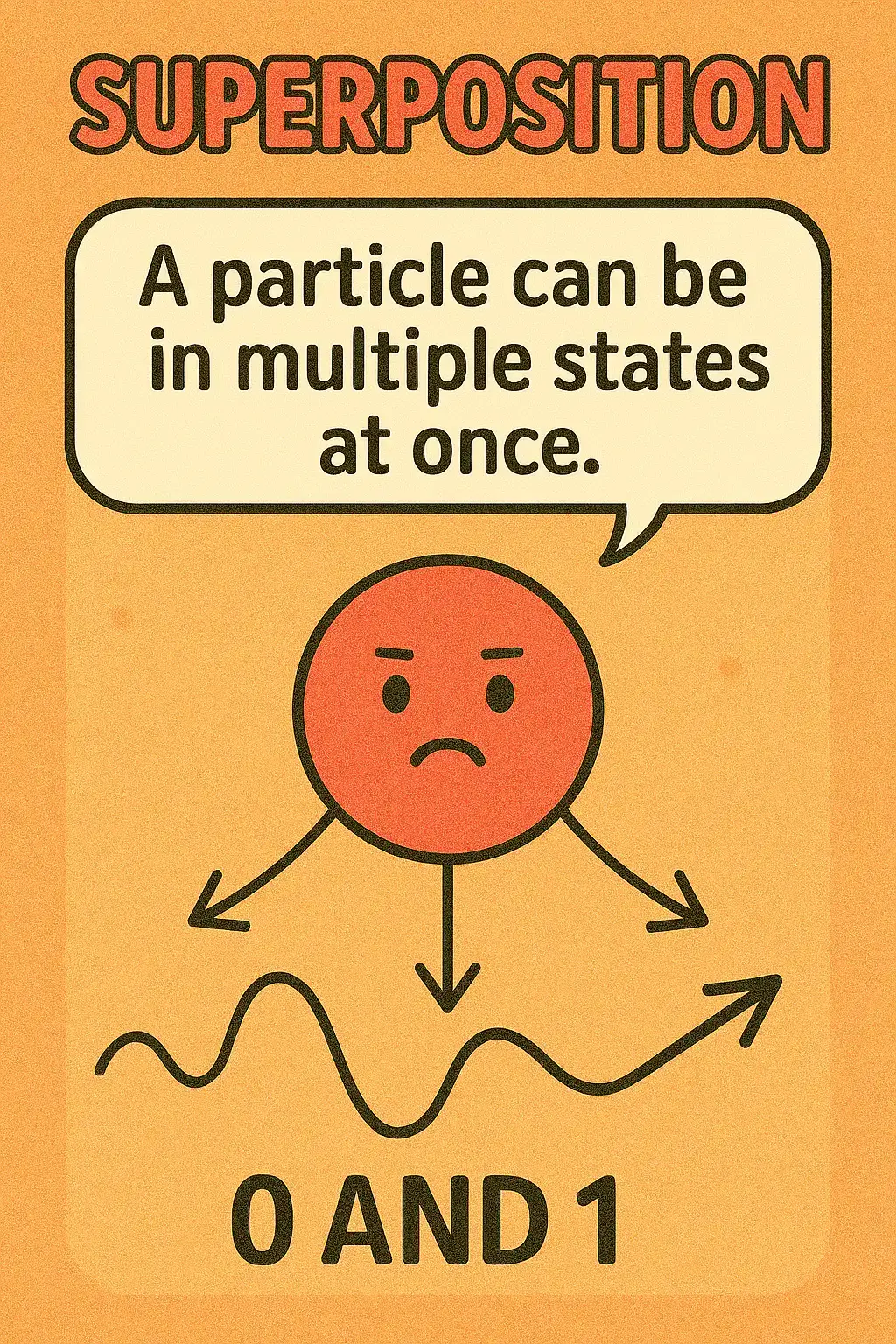Quantum Computing for Beginners: A Simple Guide
Quantum computing can sound complex, mysterious, or even intimidating. But here’s the thing: it’s just a new way of solving problems—one that leverages the strange, wonderful rules of quantum physics. This guide simplifies quantum computing, combining it with quantum physics basics, making it easy to grasp.
Table of Contents
What Exactly is Quantum Computing?

Imagine your regular computer, phone, or tablet. These devices run on bits—tiny switches that can be either 0 or 1. Quantum computers, however, run on something called qubits. Unlike bits, qubits can be 0, 1, or both at once. Weird? Welcome to quantum computing!
Yup. Mind = blown.
Quantum computers work on the concepts of quantum physics, which are different from what we are taught about in classical physics concepts.
Let’s see some of the beginner’s concepts in very easy language.
Quantum Physics Basics You Need to Know
Quantum Physics (or Quantum Mechanics) is the science of the very, very small.
It explains how things like atoms, electrons, and light actually behave — and it turns out they don’t follow the same rules as big objects like cars, balls, or planets.
Here are some of the key ideas in Quantum Physics that you should know before proceeding:
1. Particles Are Also Waves
- Tiny particles like electrons and photons (light particles) act like both particles and waves.
- This is called wave-particle duality.
- Example: In the double-slit experiment, a single electron creates an interference pattern — like a wave — even if you send one electron at a time!
2. Uncertainty is Built-In
- You can’t know everything about a particle at once.
- The more precisely you know its position, the less you know about its speed (momentum) — and vice versa.
- This is called Heisenberg’s Uncertainty Principle.
3. Things Exist in Probabilities

- In quantum physics, things don’t have definite outcomes until they’re observed.
- For example, an electron isn’t in one spot — it’s in many possible spots at the same time. When we observe it, it “chooses” one.
- This is called superposition.
4. Quantum Entanglement
- Two particles can become linked, so that what happens to one instantly affects the other — even if they’re far apart.
- Einstein called this “spooky action at a distance.” It’s real. And it’s being used in quantum computing and secure communication.
Core Ideas Behind Quantum Computing
Qubits (Quantum Bits)
- The quantum version of bits. The basic unit of quantum info.
- Qubits can represent multiple possibilities simultaneously.
- Unlike a normal bit that’s just 0 or 1, a qubit can be in a state of 0, 1, or both at once (superposition).
- Example: If you have 3 bits, you can represent one number at a time. But 3 qubits can represent 23 = 8 numbers simultaneously!
Quantum Superposition
- A qubit can exist in multiple states at the same time.
- Imagine doing all possible calculations in parallel, then collapsing to the answer when measured.
- Enables quantum computers to process many potential outcomes at once.
- Useful for complex calculations like optimizing routes, drug discoveries, and simulations.
Quantum Entanglement
- Two qubits can become entangled, so changing one instantly affects the other — even if they’re far apart.
- This allows powerful coordination between qubits, boosting performance.
- Entangled qubits work together, sharing states instantly. This drastically boosts computing power.
- Essential for quantum algorithms.
Quantum Interference
- Quantum computers use interference to amplify correct solutions and eliminate incorrect ones. It’s like filtering out noise to enhance clarity.
How Is Quantum Computing Different from Regular Computing?
| Traditional Computer | Quantum Computer |
|---|---|
| Uses bits (0 or 1) | Uses qubits (0 and 1 at once) |
| Processes data one step at a time | Can process many possibilities simultaneously |
| Great at spreadsheets, browsing, games | Great at solving complex problems too hard for regular computers |
Why is Quantum Computing Important?
Quantum computing isn’t just cool science—it could revolutionize entire industries:
- Healthcare: Quantum computing could rapidly simulate new drugs, speeding up discovery.
- Security: It might crack today’s encryption systems easily, leading to a quantum-safe cryptography race.
- Business & Logistics: Quantum solutions could optimize complex systems like supply chains, finance portfolios, and traffic management.
- Artificial Intelligence: Quantum computing could massively speed up AI training and enable powerful new algorithms.
So, Can I Buy a Quantum Laptop?
Not yet.
- Quantum computers today are experimental, expensive, and require super-cold temperatures (close to absolute zero).
- Companies like IBM, Google, Microsoft, and D-Wave are working on it.
- Quantum as a Service (QaaS) is real — some let you run small quantum experiments via the cloud.
Quick Recap
- Quantum computing uses quantum physics to handle problems regular computers can’t.
- Qubits exist in multiple states simultaneously, enabling faster, smarter calculations.
- Quantum computers are not yet everyday gadgets, but their potential impact is massive.
Quantum computing is the future of processing power. It uses the freaky laws of quantum physics to solve problems that regular computers can’t handle — by being in multiple states and coordinating in ways that sound like sci-fi, but are very real.
Now you’re set! Keep exploring, because quantum computing is not just the future—it’s happening right now.
Disclaimer: This site is reader‑supported. If you buy through some links, I may earn a small commission at no extra cost to you. I only recommend tools I trust and would use myself. Your support helps keep gauravtiwari.org free and focused on real-world advice. Thanks. — Gaurav Tiwari